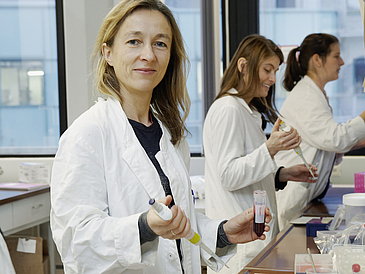A research team at the University of Bremen has identified a key protein that destroys the insulin-producing cells beta cells present in the pancreas. When activated, this protein triggers bio-chemical reactions that intermesh in much the same way as gear wheels, causing cell destruction. There are then insufficient beta cells to produce the amounts of insulin needed to keep levels of blood sugar down, and this ultimately leads to diabetes.
KathrinMädler and her research group report their ground breaking results in the latest issue of "Nature Medicine", the leading journal for biomedical research (cf. article by Amin Ardestani et al.). Their findings pave the way for new approaches for diabetes prevention by means of manipulating the protein and thus preventing Type 1 and Type 2 diabetes. Until now there has been no therapy to protect the beta cells and counteract onset of the disease.
Beta cells are mini-organs found in the Langerhans islets of the pancreas. They comprise different hormone producing cells that fulfill an important function in regulating levels of blood sugar. The destruction of beta cells results in the insulin insufficiency common to both Type 1 and Type 2 diabetes.
While looking for the protein whose signal paths lead to the destruction of beta cells the researchers stumbled across MST1. MST1 is activated in diabetic islets and leads to their destruction and inoperability. This triggers a chain reaction via the mitochondria, the cells’ power plants, and destroys the mechanism that regulates insulin production.
Investigations showed that inhibiting MST1 can protect the beta cells, subsequently improving their functionality and chances of survival. In models of Type 1 and Type 2 diabetes, the targeted neutralization of MST1 prevents the disease from taking hold. This could lead to development of a therapy against diabetes that actually protects the insulin-producing cells.
You can find more information about Prof.KathrinMädler’s research in our research magazine highlights.
For further information please contact:
University of Bremen
Faculty of Biology / Chemistry
Center for Biomolecular Interactions
Prof.Dr.KathrinMädler
Phone: +49 421 218-63290
email: kmaedlerprotect me ?!uni-bremenprotect me ?!.de

